University Global Professional Development Course Reflection Report
VerifiedAdded on 2023/01/11
|9
|2263
|92
Report
AI Summary
This report provides a comprehensive reflection on a global professional development course, focusing on the development of intercultural awareness and communication skills. The student discusses their journey of self-discovery, highlighting the importance of understanding different cultures, adapting to diverse environments, and developing empathy. The report details the application of cultural dimension models like Hofstede's and Meyer's, and explores the impact of the DMIS model. It further examines the development of operational culture within a team setting, the application of the Tuckman model, and the enhancement of communication skills. The student emphasizes the importance of cultural awareness, empathy, and the ability to work effectively in multicultural teams, and how these skills will benefit their future career. The report concludes with a discussion of the skills and strategies acquired, and how they will support the student's professional growth in a globalized workplace.
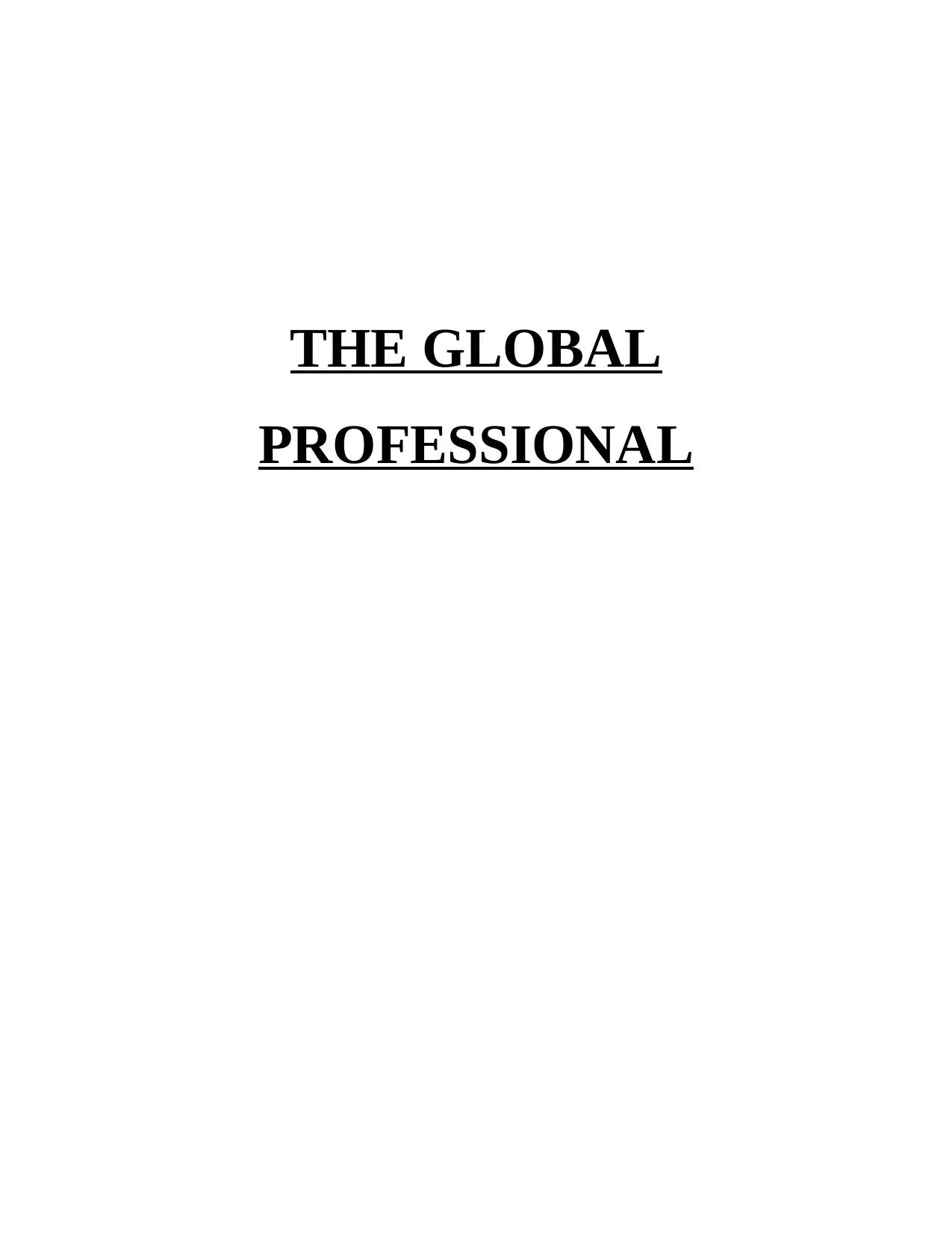
THE GLOBAL
PROFESSIONAL
PROFESSIONAL
Paraphrase This Document
Need a fresh take? Get an instant paraphrase of this document with our AI Paraphraser
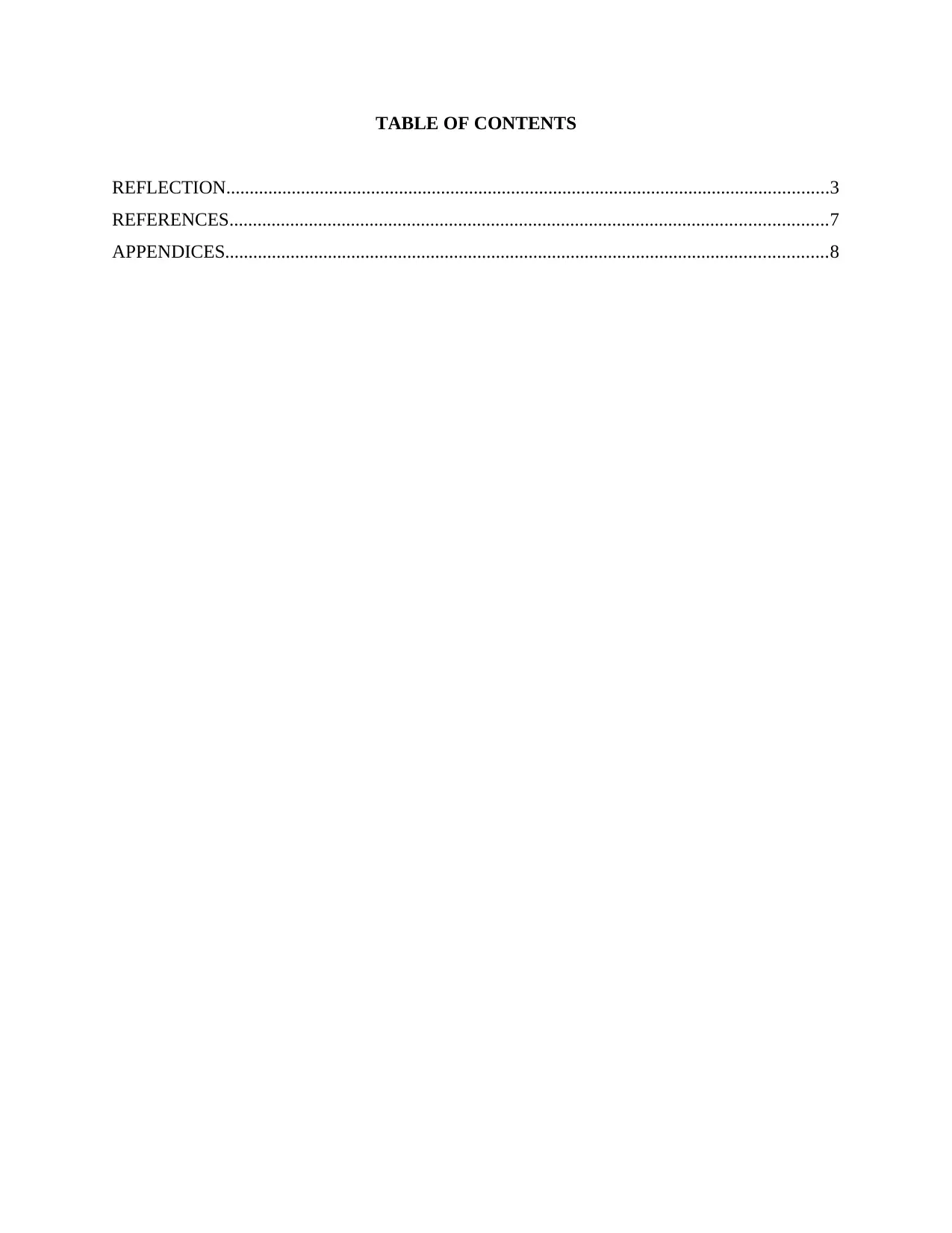
TABLE OF CONTENTS
REFLECTION.................................................................................................................................3
REFERENCES................................................................................................................................7
APPENDICES.................................................................................................................................8
REFLECTION.................................................................................................................................3
REFERENCES................................................................................................................................7
APPENDICES.................................................................................................................................8
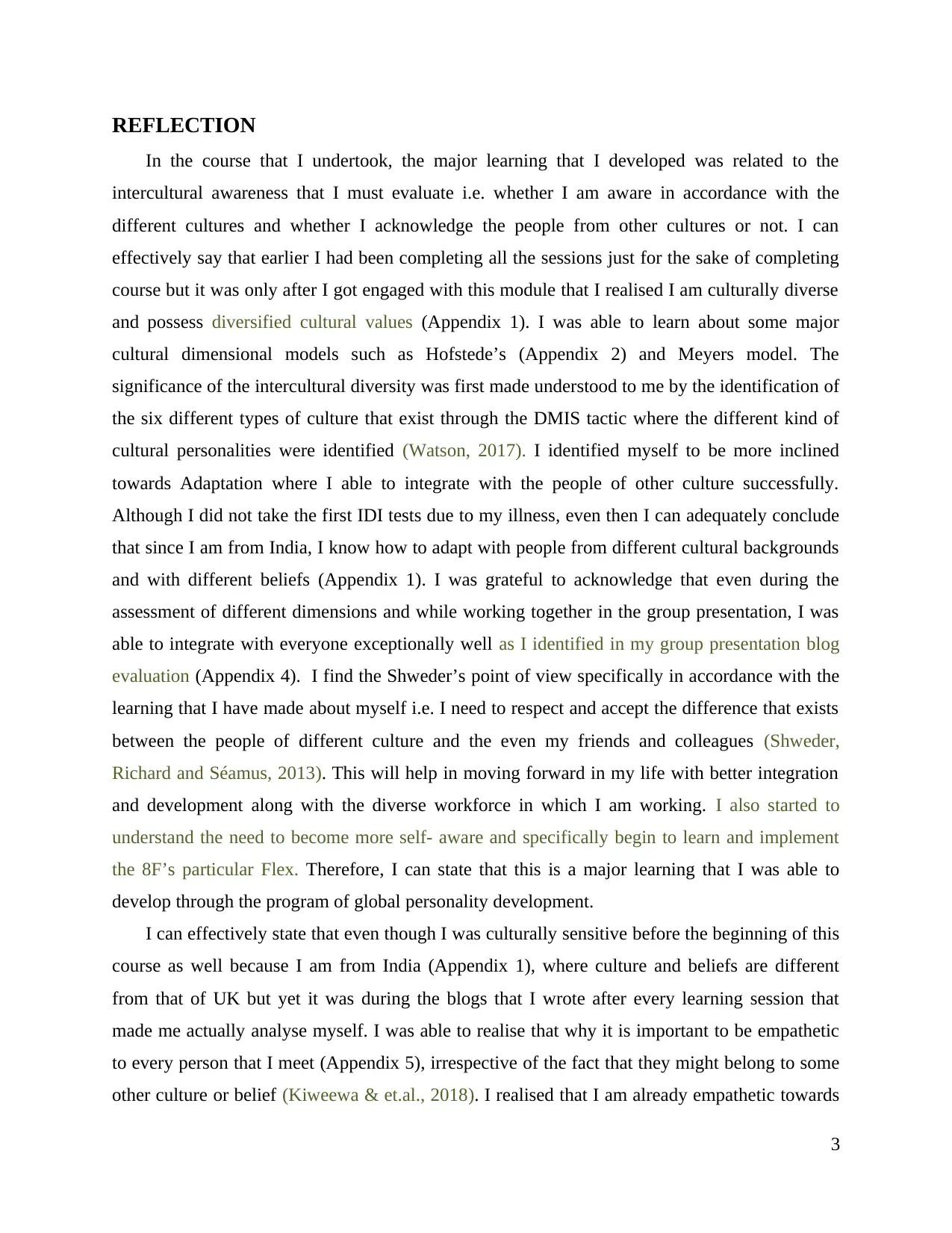
REFLECTION
In the course that I undertook, the major learning that I developed was related to the
intercultural awareness that I must evaluate i.e. whether I am aware in accordance with the
different cultures and whether I acknowledge the people from other cultures or not. I can
effectively say that earlier I had been completing all the sessions just for the sake of completing
course but it was only after I got engaged with this module that I realised I am culturally diverse
and possess diversified cultural values (Appendix 1). I was able to learn about some major
cultural dimensional models such as Hofstede’s (Appendix 2) and Meyers model. The
significance of the intercultural diversity was first made understood to me by the identification of
the six different types of culture that exist through the DMIS tactic where the different kind of
cultural personalities were identified (Watson, 2017). I identified myself to be more inclined
towards Adaptation where I able to integrate with the people of other culture successfully.
Although I did not take the first IDI tests due to my illness, even then I can adequately conclude
that since I am from India, I know how to adapt with people from different cultural backgrounds
and with different beliefs (Appendix 1). I was grateful to acknowledge that even during the
assessment of different dimensions and while working together in the group presentation, I was
able to integrate with everyone exceptionally well as I identified in my group presentation blog
evaluation (Appendix 4). I find the Shweder’s point of view specifically in accordance with the
learning that I have made about myself i.e. I need to respect and accept the difference that exists
between the people of different culture and the even my friends and colleagues (Shweder,
Richard and Séamus, 2013). This will help in moving forward in my life with better integration
and development along with the diverse workforce in which I am working. I also started to
understand the need to become more self- aware and specifically begin to learn and implement
the 8F’s particular Flex. Therefore, I can state that this is a major learning that I was able to
develop through the program of global personality development.
I can effectively state that even though I was culturally sensitive before the beginning of this
course as well because I am from India (Appendix 1), where culture and beliefs are different
from that of UK but yet it was during the blogs that I wrote after every learning session that
made me actually analyse myself. I was able to realise that why it is important to be empathetic
to every person that I meet (Appendix 5), irrespective of the fact that they might belong to some
other culture or belief (Kiweewa & et.al., 2018). I realised that I am already empathetic towards
3
In the course that I undertook, the major learning that I developed was related to the
intercultural awareness that I must evaluate i.e. whether I am aware in accordance with the
different cultures and whether I acknowledge the people from other cultures or not. I can
effectively say that earlier I had been completing all the sessions just for the sake of completing
course but it was only after I got engaged with this module that I realised I am culturally diverse
and possess diversified cultural values (Appendix 1). I was able to learn about some major
cultural dimensional models such as Hofstede’s (Appendix 2) and Meyers model. The
significance of the intercultural diversity was first made understood to me by the identification of
the six different types of culture that exist through the DMIS tactic where the different kind of
cultural personalities were identified (Watson, 2017). I identified myself to be more inclined
towards Adaptation where I able to integrate with the people of other culture successfully.
Although I did not take the first IDI tests due to my illness, even then I can adequately conclude
that since I am from India, I know how to adapt with people from different cultural backgrounds
and with different beliefs (Appendix 1). I was grateful to acknowledge that even during the
assessment of different dimensions and while working together in the group presentation, I was
able to integrate with everyone exceptionally well as I identified in my group presentation blog
evaluation (Appendix 4). I find the Shweder’s point of view specifically in accordance with the
learning that I have made about myself i.e. I need to respect and accept the difference that exists
between the people of different culture and the even my friends and colleagues (Shweder,
Richard and Séamus, 2013). This will help in moving forward in my life with better integration
and development along with the diverse workforce in which I am working. I also started to
understand the need to become more self- aware and specifically begin to learn and implement
the 8F’s particular Flex. Therefore, I can state that this is a major learning that I was able to
develop through the program of global personality development.
I can effectively state that even though I was culturally sensitive before the beginning of this
course as well because I am from India (Appendix 1), where culture and beliefs are different
from that of UK but yet it was during the blogs that I wrote after every learning session that
made me actually analyse myself. I was able to realise that why it is important to be empathetic
to every person that I meet (Appendix 5), irrespective of the fact that they might belong to some
other culture or belief (Kiweewa & et.al., 2018). I realised that I am already empathetic towards
3
⊘ This is a preview!⊘
Do you want full access?
Subscribe today to unlock all pages.

Trusted by 1+ million students worldwide
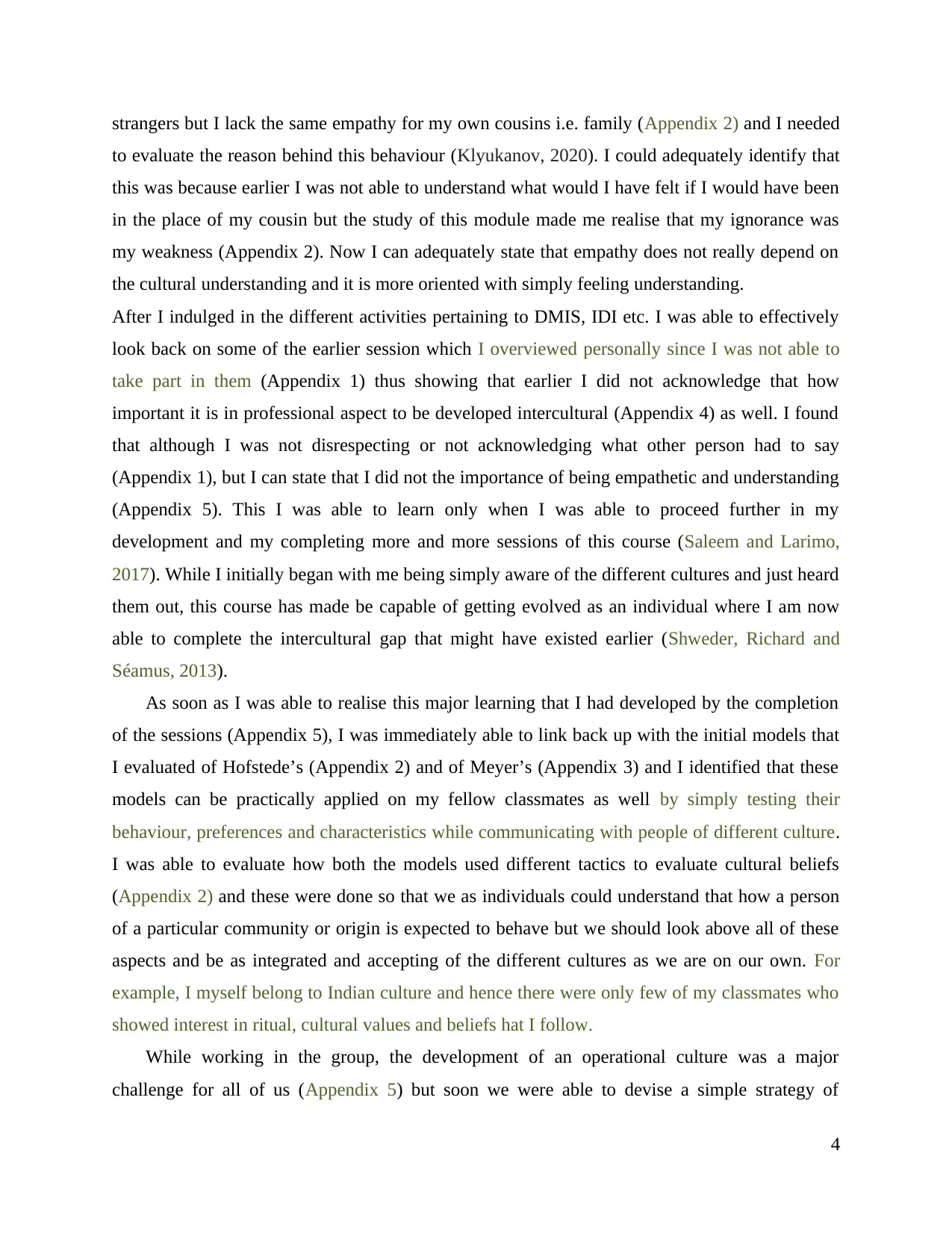
strangers but I lack the same empathy for my own cousins i.e. family (Appendix 2) and I needed
to evaluate the reason behind this behaviour (Klyukanov, 2020). I could adequately identify that
this was because earlier I was not able to understand what would I have felt if I would have been
in the place of my cousin but the study of this module made me realise that my ignorance was
my weakness (Appendix 2). Now I can adequately state that empathy does not really depend on
the cultural understanding and it is more oriented with simply feeling understanding.
After I indulged in the different activities pertaining to DMIS, IDI etc. I was able to effectively
look back on some of the earlier session which I overviewed personally since I was not able to
take part in them (Appendix 1) thus showing that earlier I did not acknowledge that how
important it is in professional aspect to be developed intercultural (Appendix 4) as well. I found
that although I was not disrespecting or not acknowledging what other person had to say
(Appendix 1), but I can state that I did not the importance of being empathetic and understanding
(Appendix 5). This I was able to learn only when I was able to proceed further in my
development and my completing more and more sessions of this course (Saleem and Larimo,
2017). While I initially began with me being simply aware of the different cultures and just heard
them out, this course has made be capable of getting evolved as an individual where I am now
able to complete the intercultural gap that might have existed earlier (Shweder, Richard and
Séamus, 2013).
As soon as I was able to realise this major learning that I had developed by the completion
of the sessions (Appendix 5), I was immediately able to link back up with the initial models that
I evaluated of Hofstede’s (Appendix 2) and of Meyer’s (Appendix 3) and I identified that these
models can be practically applied on my fellow classmates as well by simply testing their
behaviour, preferences and characteristics while communicating with people of different culture.
I was able to evaluate how both the models used different tactics to evaluate cultural beliefs
(Appendix 2) and these were done so that we as individuals could understand that how a person
of a particular community or origin is expected to behave but we should look above all of these
aspects and be as integrated and accepting of the different cultures as we are on our own. For
example, I myself belong to Indian culture and hence there were only few of my classmates who
showed interest in ritual, cultural values and beliefs hat I follow.
While working in the group, the development of an operational culture was a major
challenge for all of us (Appendix 5) but soon we were able to devise a simple strategy of
4
to evaluate the reason behind this behaviour (Klyukanov, 2020). I could adequately identify that
this was because earlier I was not able to understand what would I have felt if I would have been
in the place of my cousin but the study of this module made me realise that my ignorance was
my weakness (Appendix 2). Now I can adequately state that empathy does not really depend on
the cultural understanding and it is more oriented with simply feeling understanding.
After I indulged in the different activities pertaining to DMIS, IDI etc. I was able to effectively
look back on some of the earlier session which I overviewed personally since I was not able to
take part in them (Appendix 1) thus showing that earlier I did not acknowledge that how
important it is in professional aspect to be developed intercultural (Appendix 4) as well. I found
that although I was not disrespecting or not acknowledging what other person had to say
(Appendix 1), but I can state that I did not the importance of being empathetic and understanding
(Appendix 5). This I was able to learn only when I was able to proceed further in my
development and my completing more and more sessions of this course (Saleem and Larimo,
2017). While I initially began with me being simply aware of the different cultures and just heard
them out, this course has made be capable of getting evolved as an individual where I am now
able to complete the intercultural gap that might have existed earlier (Shweder, Richard and
Séamus, 2013).
As soon as I was able to realise this major learning that I had developed by the completion
of the sessions (Appendix 5), I was immediately able to link back up with the initial models that
I evaluated of Hofstede’s (Appendix 2) and of Meyer’s (Appendix 3) and I identified that these
models can be practically applied on my fellow classmates as well by simply testing their
behaviour, preferences and characteristics while communicating with people of different culture.
I was able to evaluate how both the models used different tactics to evaluate cultural beliefs
(Appendix 2) and these were done so that we as individuals could understand that how a person
of a particular community or origin is expected to behave but we should look above all of these
aspects and be as integrated and accepting of the different cultures as we are on our own. For
example, I myself belong to Indian culture and hence there were only few of my classmates who
showed interest in ritual, cultural values and beliefs hat I follow.
While working in the group, the development of an operational culture was a major
challenge for all of us (Appendix 5) but soon we were able to devise a simple strategy of
4
Paraphrase This Document
Need a fresh take? Get an instant paraphrase of this document with our AI Paraphraser
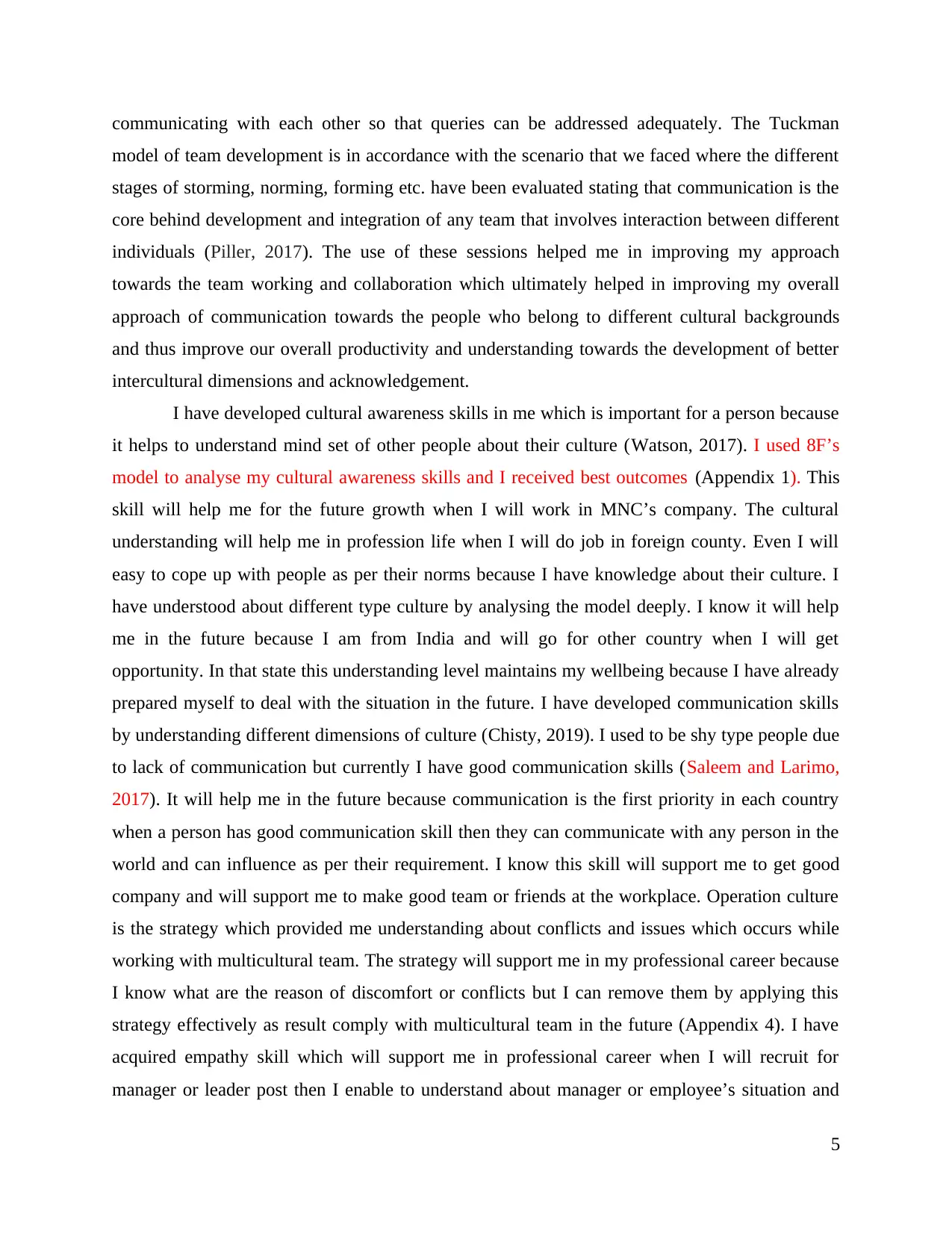
communicating with each other so that queries can be addressed adequately. The Tuckman
model of team development is in accordance with the scenario that we faced where the different
stages of storming, norming, forming etc. have been evaluated stating that communication is the
core behind development and integration of any team that involves interaction between different
individuals (Piller, 2017). The use of these sessions helped me in improving my approach
towards the team working and collaboration which ultimately helped in improving my overall
approach of communication towards the people who belong to different cultural backgrounds
and thus improve our overall productivity and understanding towards the development of better
intercultural dimensions and acknowledgement.
I have developed cultural awareness skills in me which is important for a person because
it helps to understand mind set of other people about their culture (Watson, 2017). I used 8F’s
model to analyse my cultural awareness skills and I received best outcomes (Appendix 1). This
skill will help me for the future growth when I will work in MNC’s company. The cultural
understanding will help me in profession life when I will do job in foreign county. Even I will
easy to cope up with people as per their norms because I have knowledge about their culture. I
have understood about different type culture by analysing the model deeply. I know it will help
me in the future because I am from India and will go for other country when I will get
opportunity. In that state this understanding level maintains my wellbeing because I have already
prepared myself to deal with the situation in the future. I have developed communication skills
by understanding different dimensions of culture (Chisty, 2019). I used to be shy type people due
to lack of communication but currently I have good communication skills (Saleem and Larimo,
2017). It will help me in the future because communication is the first priority in each country
when a person has good communication skill then they can communicate with any person in the
world and can influence as per their requirement. I know this skill will support me to get good
company and will support me to make good team or friends at the workplace. Operation culture
is the strategy which provided me understanding about conflicts and issues which occurs while
working with multicultural team. The strategy will support me in my professional career because
I know what are the reason of discomfort or conflicts but I can remove them by applying this
strategy effectively as result comply with multicultural team in the future (Appendix 4). I have
acquired empathy skill which will support me in professional career when I will recruit for
manager or leader post then I enable to understand about manager or employee’s situation and
5
model of team development is in accordance with the scenario that we faced where the different
stages of storming, norming, forming etc. have been evaluated stating that communication is the
core behind development and integration of any team that involves interaction between different
individuals (Piller, 2017). The use of these sessions helped me in improving my approach
towards the team working and collaboration which ultimately helped in improving my overall
approach of communication towards the people who belong to different cultural backgrounds
and thus improve our overall productivity and understanding towards the development of better
intercultural dimensions and acknowledgement.
I have developed cultural awareness skills in me which is important for a person because
it helps to understand mind set of other people about their culture (Watson, 2017). I used 8F’s
model to analyse my cultural awareness skills and I received best outcomes (Appendix 1). This
skill will help me for the future growth when I will work in MNC’s company. The cultural
understanding will help me in profession life when I will do job in foreign county. Even I will
easy to cope up with people as per their norms because I have knowledge about their culture. I
have understood about different type culture by analysing the model deeply. I know it will help
me in the future because I am from India and will go for other country when I will get
opportunity. In that state this understanding level maintains my wellbeing because I have already
prepared myself to deal with the situation in the future. I have developed communication skills
by understanding different dimensions of culture (Chisty, 2019). I used to be shy type people due
to lack of communication but currently I have good communication skills (Saleem and Larimo,
2017). It will help me in the future because communication is the first priority in each country
when a person has good communication skill then they can communicate with any person in the
world and can influence as per their requirement. I know this skill will support me to get good
company and will support me to make good team or friends at the workplace. Operation culture
is the strategy which provided me understanding about conflicts and issues which occurs while
working with multicultural team. The strategy will support me in my professional career because
I know what are the reason of discomfort or conflicts but I can remove them by applying this
strategy effectively as result comply with multicultural team in the future (Appendix 4). I have
acquired empathy skill which will support me in professional career when I will recruit for
manager or leader post then I enable to understand about manager or employee’s situation and
5

keeps my perspective Infront of them. It will help me build good relationship with employees in
the workplace (Appendix 5). I used peer model to analyse my empathy skills and social skills.
Thus, these all strategies, skills and understanding will assist me to in future professional career.
6
the workplace (Appendix 5). I used peer model to analyse my empathy skills and social skills.
Thus, these all strategies, skills and understanding will assist me to in future professional career.
6
⊘ This is a preview!⊘
Do you want full access?
Subscribe today to unlock all pages.

Trusted by 1+ million students worldwide
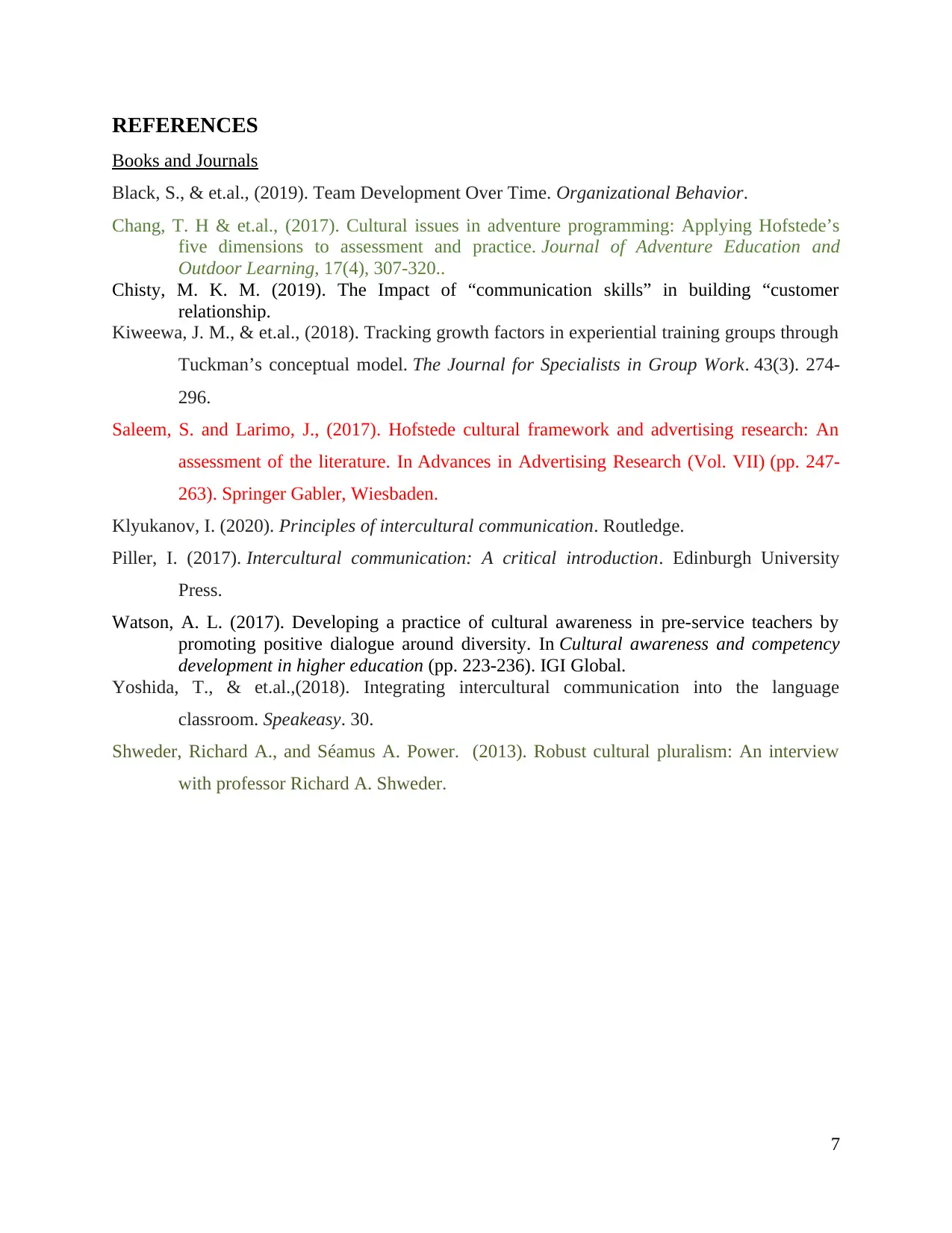
REFERENCES
Books and Journals
Black, S., & et.al., (2019). Team Development Over Time. Organizational Behavior.
Chang, T. H & et.al., (2017). Cultural issues in adventure programming: Applying Hofstede’s
five dimensions to assessment and practice. Journal of Adventure Education and
Outdoor Learning, 17(4), 307-320..
Chisty, M. K. M. (2019). The Impact of “communication skills” in building “customer
relationship.
Kiweewa, J. M., & et.al., (2018). Tracking growth factors in experiential training groups through
Tuckman’s conceptual model. The Journal for Specialists in Group Work. 43(3). 274-
296.
Saleem, S. and Larimo, J., (2017). Hofstede cultural framework and advertising research: An
assessment of the literature. In Advances in Advertising Research (Vol. VII) (pp. 247-
263). Springer Gabler, Wiesbaden.
Klyukanov, I. (2020). Principles of intercultural communication. Routledge.
Piller, I. (2017). Intercultural communication: A critical introduction. Edinburgh University
Press.
Watson, A. L. (2017). Developing a practice of cultural awareness in pre-service teachers by
promoting positive dialogue around diversity. In Cultural awareness and competency
development in higher education (pp. 223-236). IGI Global.
Yoshida, T., & et.al.,(2018). Integrating intercultural communication into the language
classroom. Speakeasy. 30.
Shweder, Richard A., and Séamus A. Power. (2013). Robust cultural pluralism: An interview
with professor Richard A. Shweder.
7
Books and Journals
Black, S., & et.al., (2019). Team Development Over Time. Organizational Behavior.
Chang, T. H & et.al., (2017). Cultural issues in adventure programming: Applying Hofstede’s
five dimensions to assessment and practice. Journal of Adventure Education and
Outdoor Learning, 17(4), 307-320..
Chisty, M. K. M. (2019). The Impact of “communication skills” in building “customer
relationship.
Kiweewa, J. M., & et.al., (2018). Tracking growth factors in experiential training groups through
Tuckman’s conceptual model. The Journal for Specialists in Group Work. 43(3). 274-
296.
Saleem, S. and Larimo, J., (2017). Hofstede cultural framework and advertising research: An
assessment of the literature. In Advances in Advertising Research (Vol. VII) (pp. 247-
263). Springer Gabler, Wiesbaden.
Klyukanov, I. (2020). Principles of intercultural communication. Routledge.
Piller, I. (2017). Intercultural communication: A critical introduction. Edinburgh University
Press.
Watson, A. L. (2017). Developing a practice of cultural awareness in pre-service teachers by
promoting positive dialogue around diversity. In Cultural awareness and competency
development in higher education (pp. 223-236). IGI Global.
Yoshida, T., & et.al.,(2018). Integrating intercultural communication into the language
classroom. Speakeasy. 30.
Shweder, Richard A., and Séamus A. Power. (2013). Robust cultural pluralism: An interview
with professor Richard A. Shweder.
7
Paraphrase This Document
Need a fresh take? Get an instant paraphrase of this document with our AI Paraphraser
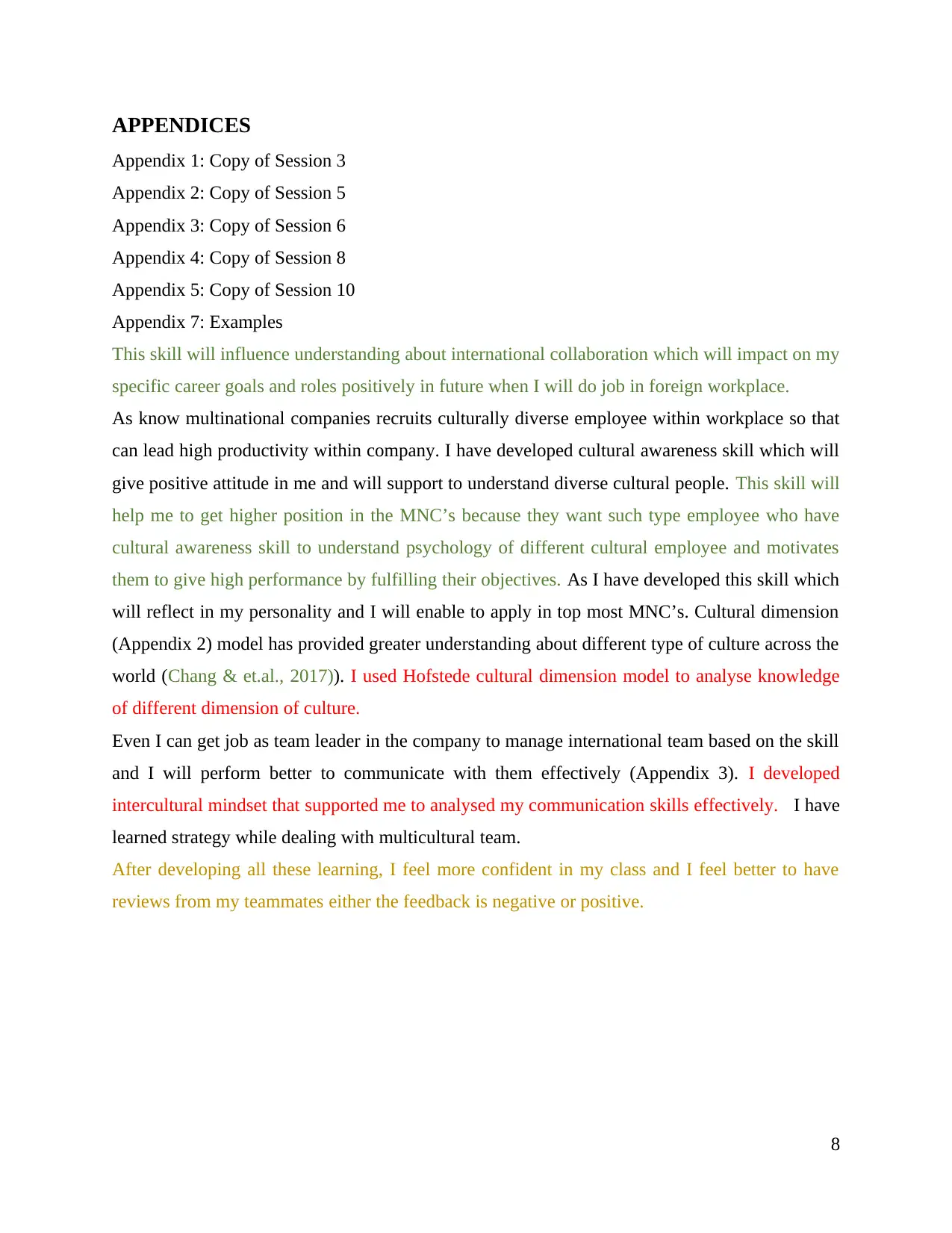
APPENDICES
Appendix 1: Copy of Session 3
Appendix 2: Copy of Session 5
Appendix 3: Copy of Session 6
Appendix 4: Copy of Session 8
Appendix 5: Copy of Session 10
Appendix 7: Examples
This skill will influence understanding about international collaboration which will impact on my
specific career goals and roles positively in future when I will do job in foreign workplace.
As know multinational companies recruits culturally diverse employee within workplace so that
can lead high productivity within company. I have developed cultural awareness skill which will
give positive attitude in me and will support to understand diverse cultural people. This skill will
help me to get higher position in the MNC’s because they want such type employee who have
cultural awareness skill to understand psychology of different cultural employee and motivates
them to give high performance by fulfilling their objectives. As I have developed this skill which
will reflect in my personality and I will enable to apply in top most MNC’s. Cultural dimension
(Appendix 2) model has provided greater understanding about different type of culture across the
world (Chang & et.al., 2017)). I used Hofstede cultural dimension model to analyse knowledge
of different dimension of culture.
Even I can get job as team leader in the company to manage international team based on the skill
and I will perform better to communicate with them effectively (Appendix 3). I developed
intercultural mindset that supported me to analysed my communication skills effectively. I have
learned strategy while dealing with multicultural team.
After developing all these learning, I feel more confident in my class and I feel better to have
reviews from my teammates either the feedback is negative or positive.
8
Appendix 1: Copy of Session 3
Appendix 2: Copy of Session 5
Appendix 3: Copy of Session 6
Appendix 4: Copy of Session 8
Appendix 5: Copy of Session 10
Appendix 7: Examples
This skill will influence understanding about international collaboration which will impact on my
specific career goals and roles positively in future when I will do job in foreign workplace.
As know multinational companies recruits culturally diverse employee within workplace so that
can lead high productivity within company. I have developed cultural awareness skill which will
give positive attitude in me and will support to understand diverse cultural people. This skill will
help me to get higher position in the MNC’s because they want such type employee who have
cultural awareness skill to understand psychology of different cultural employee and motivates
them to give high performance by fulfilling their objectives. As I have developed this skill which
will reflect in my personality and I will enable to apply in top most MNC’s. Cultural dimension
(Appendix 2) model has provided greater understanding about different type of culture across the
world (Chang & et.al., 2017)). I used Hofstede cultural dimension model to analyse knowledge
of different dimension of culture.
Even I can get job as team leader in the company to manage international team based on the skill
and I will perform better to communicate with them effectively (Appendix 3). I developed
intercultural mindset that supported me to analysed my communication skills effectively. I have
learned strategy while dealing with multicultural team.
After developing all these learning, I feel more confident in my class and I feel better to have
reviews from my teammates either the feedback is negative or positive.
8

9
⊘ This is a preview!⊘
Do you want full access?
Subscribe today to unlock all pages.

Trusted by 1+ million students worldwide
1 out of 9
Related Documents
Your All-in-One AI-Powered Toolkit for Academic Success.
+13062052269
info@desklib.com
Available 24*7 on WhatsApp / Email
![[object Object]](/_next/static/media/star-bottom.7253800d.svg)
Unlock your academic potential
Copyright © 2020–2026 A2Z Services. All Rights Reserved. Developed and managed by ZUCOL.





